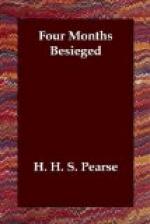Spion Kop in columns miles long. Others emerged
from the defile by Underbrook like huge serpents twining
about the hillsides. Waggons were crowded together
by hundreds. If one could not go fast enough
it had to fall out of the road, making way for others.
Above them hung dense dust clouds. Elsewhere in
the open, dust whirled in thinner, higher wreaths
above groups of horsemen hurrying off in confusion,
and paying no heed to the straits of their transport.
A beaten army in full retreat if I have ever seen
one! Still people doubted and grew uneasy, because
of General Buller’s silence. Bulwaan fired
a single shot by way of parting salute, and then a
tripod was rigged up for lifting “Puffing Billy”
from his carriage. It was a bold thing to do
in broad daylight, and our naval 12-pounders made short
work of it by battering the tripod over. After
that a steady fire was kept up on the battery to prevent,
if possible, the Boers from moving their guns.
Afternoon sunshine enabled General Buller to heliograph the reassuring message for which Ladysmith had been waiting so anxiously. He said: “I beat the enemy thoroughly yesterday, and am sending my cavalry on as fast as very bad roads will admit to ascertain where they are going. I believe the enemy to be in full retreat.”
It was even so. General Buller and his gallant army, by dint of heroic qualities, with an unshakable determination which faltered before nothing; with a patient endurance which bore all things unmurmuringly; with a sublime courage face to face with the enemy which has earned them the often unwilling praise of the world, had overcome at last. On the night of 28th February, when the above note was written, the head of the relief column, under Lord Dundonald, arrived in the town.
CHAPTER XIII
RELIEF AT LAST
The beginning of the end—Buller’s last advance—Heroic Inniskillings—The coming of Dundonald—A welcome at Klip River Drift—A weather-stained horseman—The Natal troopers—Cheers and tears—A grand old General—Sir George White’s address—“Thank God, we have kept the flag flying!”—“God save the Queen”—Arrival of Buller—Looking backward—Within four days of starvation—Horseflesh a mere memory—Eight hundred sick and wounded—A word in tribute—Conclusion.
The beginning of the end had come on 13th February, when General Buller’s army of relief had opened the attack on Hussar Hill. From that day fighting had been fierce and practically continuous, the enemy giving way only after the most stubborn resistance, and taking advantage of every opportunity to make a stand. During that fortnight over 2000 officers and men of General Buller’s force paid the price of their dauntless courage; and in all the glorious story no page is brighter than that which puts on undying record the devoted gallantry of the Inniskillings, who




